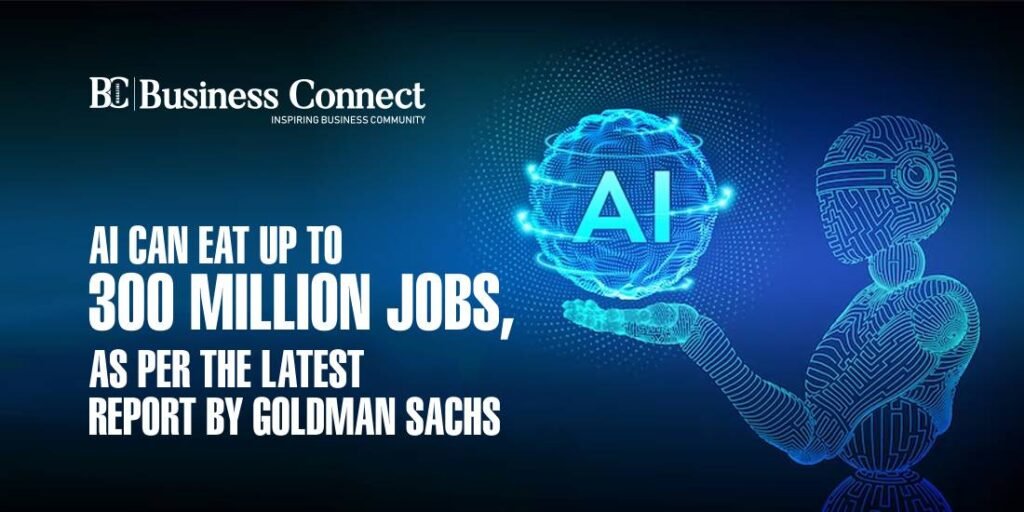AI can Eat up to 300 million Jobs, as per the Latest Report by Goldman Sachs
The question of whether artificial intelligence will replace people in the workforce is one that keeps coming up as AI gains popularity on a worldwide scale. The answer, which is not good news, is addressed in a recent study from the investment firm Goldman Sachs. According to the estimate, “AI may replace the equivalent of almost 300 million full-time jobs, according to BBC.” In the US and Europe, almost two-thirds of jobs are at some risk of automation.
We might soon lose our jobs to generative AI like OpenAI’s ChatGPT.
The amazing AI chatbot has been used to generate cover letters, produce a children’s book, and even assist students in plagiarising essays since its November 2018 launch.
We may be underestimating the chatbot’s capabilities. The bot might theoretically be hired by Google as an entry-level programmer if it conducted an interview. Employees at Amazon who evaluated ChatGPT stated the chatbot is “extremely powerful” at creating training materials, “does a wonderful job” at handling customer service concerns, and resolves queries related to the corporate strategy. However, ChatGPT isn’t flawless. Users of ChatGPT found that the bot can produce fundamental math errors, false information, and wrong answers to coding difficulties.
A seven per cent increase in the total annual value of goods and services produced globally over a ten-year period is also possible, which would result in a productivity boom.
The survey states that lawyers and administrative personnel are most at risk of losing their jobs to automation. But the growth of AI will have “minimal influence” on jobs requiring manual labour and outdoor work.
According to the analysis, the administrative and legal sectors will be most affected, with 46% of administrative positions and 44% of legal jobs at risk of being replaced by AI. The report states that although administrative occupations would probably be eliminated in the near future due to AI breakthroughs, it might also help with current positions and reduce the workload of US workers by 25% to 50%, allowing them to be more productive in other areas.
The potential of generative AI to produce content such as photographs, videos, music, text, and 3D models that are distinct from human work is described as “a big advancement” by Goldman Sachs and is expected to have an influence on all types of occupations.
As per the study by the BBC, “workers have been displaced faster than jobs have been generated” since 1980 as a result of technological advancements. The paper further stated that this could indicate that when AI develops further, it will reduce jobs for a while.
Physically demanding occupations are not in high danger; maintenance has a 4% likelihood of replacement, while construction faces a 6% threat. It also claims that practically every profession will be impacted, if not entirely.
“400 million people could be displaced due to AI by the year 2030”, according to a McKinsey Research Institute study that was released in 2018. Also, it was discovered that the annual value of AI might range from $3.5 trillion to $5.8 trillion. The study also references data that claims that 60% of workers today are doing jobs that didn’t even exist in 1940.
Labour productivity is expected to rise over the next ten years, according to Goldman Sachs experts, who also forecast that AI could boost the global economy’s yearly GDP by 7%.
White-collar workers “appear to be more exposed to these technologies” than blue-collar workers and may be obliged to use AI to help them accomplish their jobs in the near future, according to Muro, who does not believe that AI will displace millions of jobs anytime soon.
Instead of seeing these as whole replacements, Madgavkar advised, “We have to think of these things as productivity-increasing tools.”
Anu Madgavkar, a partner at the McKinsey Global Institute, a centre for economic research, agrees. To prevent bias and mistakes, she believes that these systems still require human judgement.
But Muro anticipates that in the future, AI will only get more affordable and sophisticated, which might potentially disrupt white-collar jobs as we currently know them.
Economists predict a “productivity boom” that might “significantly accelerate economic growth” as a result of AI’s potential to lower labour costs, boost productivity, and generate new jobs. The timing of such a surge, however, “is difficult to forecast.”



